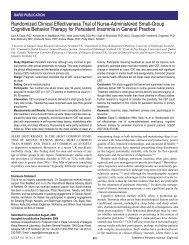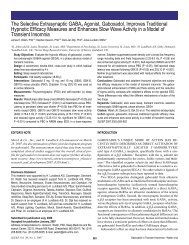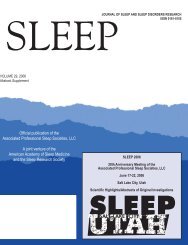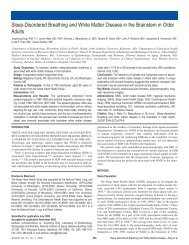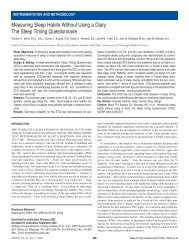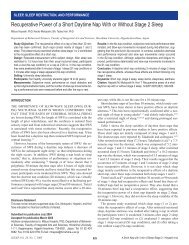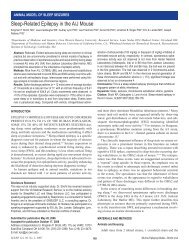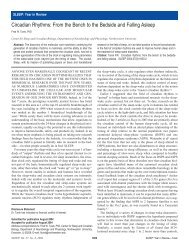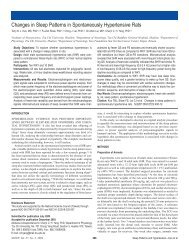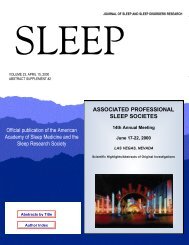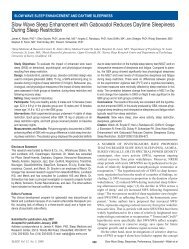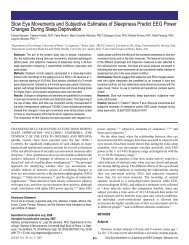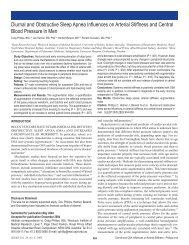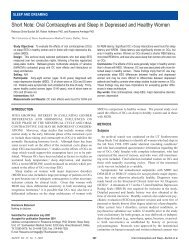SLEEP 2011 Abstract Supplement
SLEEP 2011 Abstract Supplement
SLEEP 2011 Abstract Supplement
Create successful ePaper yourself
Turn your PDF publications into a flip-book with our unique Google optimized e-Paper software.
B. Clinical Sleep Science IX. Psychiatric and Behavioral Disorders and Sleep<br />
Styles Questionnaire (RSQ), and Obsessive-Compulsive Drinking Scale<br />
(OCDS), and the Insomnia Severity Index (ISI) for insomnia.<br />
Results: Independent of insomnia diagnosis, alcoholics scored higher<br />
on the ISI (p=.001) and OCDS (p=.002), but only the AD-INS group<br />
rated higher than controls on the APSQ (p=.008) and the RSQ (p=.003).<br />
In ADs only, and controlling for insomnia diagnosis, APSQ was significantly<br />
correlated with ISI (R2=.693), RSQ (R2=.525), and with the ‘obsessive<br />
thoughts’ OCDS subscale (R2=.488). RSQ was not correlated<br />
with the ISI or OCDS.<br />
Conclusion: These findings suggest that subjects with AD-INS have<br />
global ruminative thought processes that encompass self-focused depressive<br />
thoughts (RSQ), preoccupation with sleep (APSQ), and preoccupation<br />
with alcohol (OCDS). Conversely, depressive rumination was<br />
not associated with thinking about drinking. Combined, these observations<br />
can be interpreted to indicate that primary insomnia and alcohol<br />
dependence share common cognitive processes that play a role in maintaining<br />
the disorders.<br />
Support (If Any): R37 AA007065-22S1, NIH-NIAAA R01 AA016117,<br />
NIH-NIAAA<br />
0729<br />
<strong>SLEEP</strong> DISTURBANCES AMONG FORMER HEROIN<br />
ADDICTS WITH AND WITHOUT METHADONE<br />
MAINTENANCE TREATMENT: A CASE-CONTROL STUDY<br />
Lee H 1,2,3 , Chen C 1,2 , Wang S 4<br />
1<br />
Department of Psychiatry, School of Medicine, College of Medicine,<br />
Taipei Medical University, Taipei, Taiwan, 2 Department of Psychiatry,<br />
Shuang Ho Hospital, Taipei Medical University, New Taipei, Taiwan,<br />
3<br />
Sleep Center, Taipei Medical University Hospital, Taipei, Taiwan,<br />
4<br />
Division of Mental Health and Substance Abuse Research, National<br />
Health Research Institute, Miaoli County, Taiwan<br />
Introduction: Poor sleep quality has been reported to be commonly<br />
seen among heroin addicts. Although methadone maintenance treatment<br />
(MMT) could help patients in recovery from heroin dependence, the<br />
majority of MMT patients remained suffering from sleep disturbances.<br />
However, studies in this field have received little attention. Thus, this<br />
study aims to investigate the distributions of sleep disturbances and their<br />
associations with psychological distresses and quality of life among<br />
MMT patients, compared with former heroin addicts without MMT.<br />
Methods: The study cohort included 82 MMT patients. Besides, 88 previous<br />
heroin addicts not receiving MMT were collected for comparison.<br />
All subjects received overnight ECG monitoring at home for the assessment<br />
of cardiopulmonary coupling during sleep. Patients filled out valid<br />
questionnaires including the Chinese Pittsburgh Sleep Quality Index<br />
(CPSQI), the Epworth Sleepiness Scale (ESS), the Insomnia Severity<br />
Index (ISI) and WHO Quality of Life-Brief version (WHOQOL-BREF)<br />
at next morning. Specific sleep disorders and comorbid psychiatric disorders<br />
were assessed by clinical interview.<br />
Results: More than two thirds (67.9%) of MMT patients suffered from<br />
poor sleep quality and one forth (25.6%) of them reported excessive<br />
daytime sleepiness. Compared to patients not receiving MMT, MMT<br />
patients were more likely to have poor sleep quality indicated by higher<br />
mean scores in CPSQI, ESS and ISI. MMT patients reported poorer<br />
quality of life. There were no significant differences in the distribution<br />
of specific sleep disorders and cardiopulmonary coupling during sleep<br />
between former heroin addicts with and without MMT.<br />
Conclusion: Our study indicated that MMT patients were more likely to<br />
suffer from sleep disturbances than previous heroin addicts not receiving<br />
MMT. Furthermore, poor sleep quality among MMT patients could lead<br />
to poor quality of life. The associations between sleep disturbances and<br />
psychiatric co-morbidities were also demonstrated among this specific<br />
population.<br />
Support (If Any): This study was supported by a grant from the National<br />
Science Counsil in Taiwan (NSC 98-2314-B-038-026-MY2).<br />
0730<br />
<strong>SLEEP</strong> CONTINUITY IS IMPAIRED AS A FUNCTION OF<br />
AVERAGE NUMBER OF DAILY CIGARETTES AND TIME<br />
SINCE SMOKING ONSET IN OTHERWISE HEALTHY<br />
SMOKERS<br />
Soreca I, Conklin C, Richardson A, Mumma J, Wettlaufer B, Curet D<br />
Psychiatry, University of Pittsburgh, Pittsburgh, PA, USA<br />
Introduction: Cigarette smoking is the most important cause of preventable<br />
morbidity and premature death in the United States. In addition to<br />
adverse effects on respiratory, cardiovascular and cerebrovascular systems,<br />
cigarette smoking may also increase morbidity by impairing sleep.<br />
Most of the empirical evidence on the detrimental effects of smoking on<br />
sleep is based on population surveys and self-report measures. Moreover,<br />
virtually no study to date has investigated the effects of cigarette smoking<br />
on sleep by segregating them from the effects of smoking-related medical<br />
comorbidities, such as sleep disordered breathing. The aims of this study<br />
are 1) to objectively investigate behavioral correlates of sleep by means<br />
of wrist actigraphy in otherwise healthy smokers and 2) explore the relationship<br />
between sleep characteristics and smoking history.<br />
Methods: 10 otherwise healthy smokers, who had been smoking at least<br />
10 cigarettes/day for the past year, wore a wrist actigraph on their nondominant<br />
arm to objectively establish habitual sleep patterns for two<br />
weeks. Time since onset of smoking, maximum amount of cigarettes<br />
per day and current amount of cigarettes per day were derived from the<br />
Smoking History Form (SHF II)<br />
Results: Current average number of cigarettes per day and time since<br />
smoking onset were associated with higher sleep fragmentation index<br />
(r-.86, p=.006 and r=.84, p=.008 respectively) after adjusting for age.<br />
Conclusion: Cigarettes smoking impairs sleep continuity even in the<br />
absence of sleep disordered breathing and other medical comorbidities.<br />
The degree of impairment is related to current severity and duration of<br />
smoking.<br />
Support (If Any): NIDA 1R01DA027508 - 01<br />
0731<br />
EFFECTIVE TRANSLATION OF THE PITTSBURGH <strong>SLEEP</strong><br />
QUALITY INDEX INTO URDU<br />
Surani A 1 , Hesselbacher S 2 , Khaliqdina JS 1 , Subramanian S 2 ,<br />
Surani S 2,3<br />
1<br />
Dow University of Health Sciences, Karachi, Pakistan, 2 Section of<br />
Pulmonary, Critical Care, and Sleep Medicine, Baylor College of<br />
Medicine, Houston, TX, USA, 3 Department of Medicine, Texas A&M<br />
University, Corpus Christi, TX, USA<br />
Introduction: The Pittsburgh Sleep Quality Index (PSQI) is a questionnaire<br />
used in English speaking countries for assessment of sleep quality<br />
and disturbances in patients with psychiatric disorders. The instrument<br />
has been translated into many languages; it has not yet been validated in<br />
the Urdu-speaking population. Our purpose was to translate and validate<br />
the PSQI for use in Urdu-speaking countries.<br />
Methods: The original PSQI was translated into Urdu (PSQI-Ur) in<br />
three phases: translation and back-translation, committee-based translation,<br />
and testing in bilingual individuals, before final approval of the<br />
PSQI-Ur version. Subsequently, a prospective study was performed in<br />
healthy bilingual subjects to assess the validity of the PSQI-Ur version<br />
compared to the original PSQI in the English version.<br />
Results: Both English and Urdu versions of the PSQI were administered<br />
to 89 bilingual subjects (67% female, age range 15-70 years) in random<br />
order. The mean (± s.d.) global PSQI score was 5.73 ± 2.54 in English<br />
language and 5.63 ± 2.59 in the PSQI-Ur (p=1.00). The PSQI-Ur score<br />
was highly correlated with the English PSQI (rho=0.944, p



